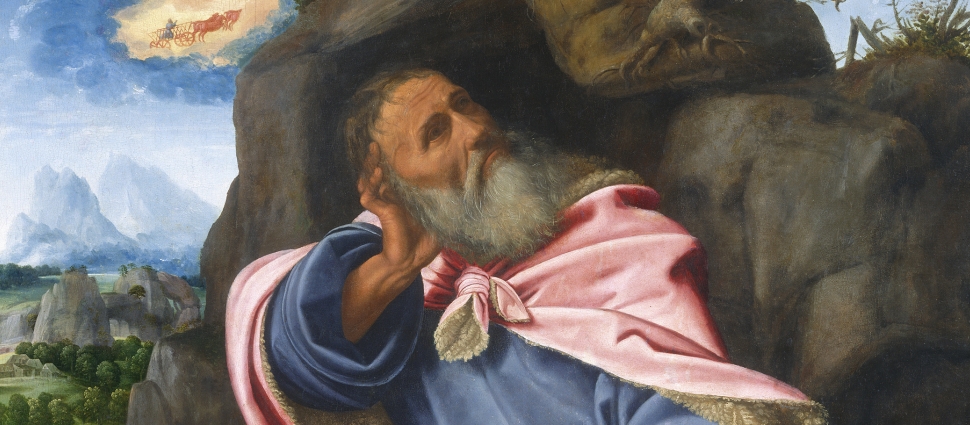The Troubler of Israel

I always looked up to my dad. From the day of my birth until his death seven years ago, I quite literally looked up to him. He was a big guy at 6’ 2”, and I never attained his stature. Yet there is a more profound reason that I continue to look up to my dad even after his death: he stood up to bullies.
Working in a union environment, my dad was remarkably engaged in defending the “little guy” against intimidation or double standards in the shop. I remember Dad regularly serving as one of his local’s Business Managers, a full-time position that engaged him in helping other workers get their jobs back when management fired them. On several occasions at union social events (e.g., Phillies games, trips to Dorney Park, Labor Day picnics, etc.), men came up to me to tell me that my dad had helped them out, saying “your father is a good guy.” I’ll never forget that about my dad.
However, not everyone applauds the man who stands up to bullies. Namely, the bully sees such a man as a nuisance and instigator of needless trouble. Such was certainly the case with the courageous prophet Elijah before wicked King Ahab.
In 1 Kings 18, King Ahab sends out the God-fearing court official (and lesser prophet) Obadiah to survey the famished land of Israel in search of grass and pasture for the royal horses, donkeys, and cattle. While Obadiah is on his errand, he runs into Elijah who is himself pursuing a different task. According to the chapter’s opening verse, the Lord has summoned Elijah and sent him out to appear before King Ahab. In an interesting exchange between the prophets, Elijah directs Obadiah to bring Ahab to him for a meeting, so that he might show himself to Israel’s notorious king.
What follows is a fascinating account of prophetic courage in the face of intimidation. When Ahab sees Elijah in verse 17, he says “Is this you, you troubler of Israel?” Behind these imperious words of the king lies a threat. Insofar as Elijah has troubled Ahab’s kingdom, the monarch is resolved to restore order by eliminating the prophet. In Ahab’s twisted estimation, Elijah is an enemy of the state.
How does Elijah respond to the king’s threatening invective? Verse 18 records for us Elijah’s prophetic reply. “I have not troubled Israel, but you and your father’s house have, because you have forsaken the commandments of the Lord and you have followed the Baals.” In other words, Elijah forsakes the king’s baseless charge and attributes Israel’s calamity to Ahab and his house. It is Ahab who has rebelled against God and brought divine judgment upon Israel. Elijah the man of God did not stand down in the face of Ahab’s bullying. He rather stands up to the bully and the rest of the chapter records a vindication of God’s cause and Elijah’s place in it.
What was the source of Elijah’s courage? Is there some lesson to be gleaned from this account of his confrontation of King Ahab the bully par excellence? The next episode in the narrative of 1 Kings 18 — Elijah’s contest with the prophets of Baal — shows us that Elijah’s courage was founded on nothing less than the Word and Name of God. So it must be with all those who would resist godless intimidation today.
Whether the bullying comes from violent persecutors, malicious bloggers, misguided presbyters, or someone else entirely, we must look to Christ the living Word, the Name above all names. In Him alone can we rest. Upon Him alone do we stand.
My dad was rough around the edges in a blue-collar kind of way, but he did not relish conflict or confrontation. One time when my seven-year-old self excitedly pointed out that he made the front page of the Philadelphia Inquirer for standing in a picket line to obstruct a trolley car, Dad gently quelled my enthusiasm by saying, “that’s nothing to be happy about, Zachary. That’s a terrible way to get in the paper.” Elijah was rough around the edges in a prophet of God kind of way, but he did not relish conflict or confrontation. Immediately after his bout with Ahab and the prophets of Baal, Elijah “went up to the top of Carmel; and he crouched down on the earth and put his face between his knees” (1 Kings 18:42). The confrontation drained him and he needed the refreshment that comes only from communion with the Lord. So it shall be with all those who would resist godless intimidation today.
By all means, stand up to bullies. Be wise. Be of noble character. Be gentle and lowly. Be patient. Be strong. Be poured out as a drink offering to the Lord. But in every way, be dependent upon Christ.
Zachary Groff is Director of Advancement & Admissions at Greenville Presbyterian Theological Seminary in Taylors, SC, and Pastor of Antioch Presbyterian Church (PCA) in Woodruff, SC.
Related Links
"Conflict, Comfort and the Cross" by Adam Parker
"Time Is Short. Be Patient." by Megan Hill
"Sobriety and the Gospel" by Gabriel Williams
Rules for Walking in Fellowship by John Owen
The Pastor: His Call, Character, and Work, with an introduction by Sinclair B. Ferguson




